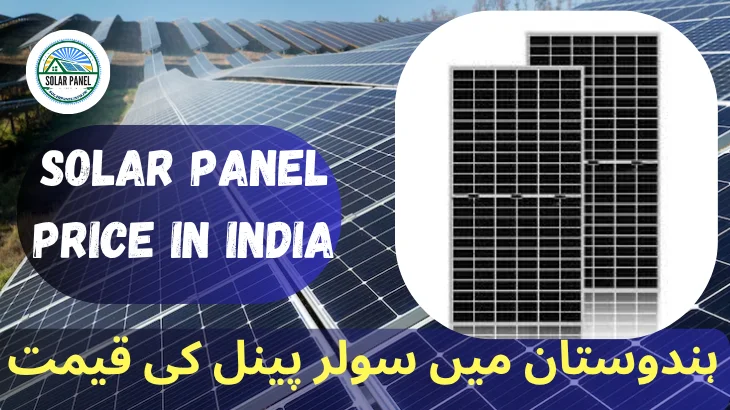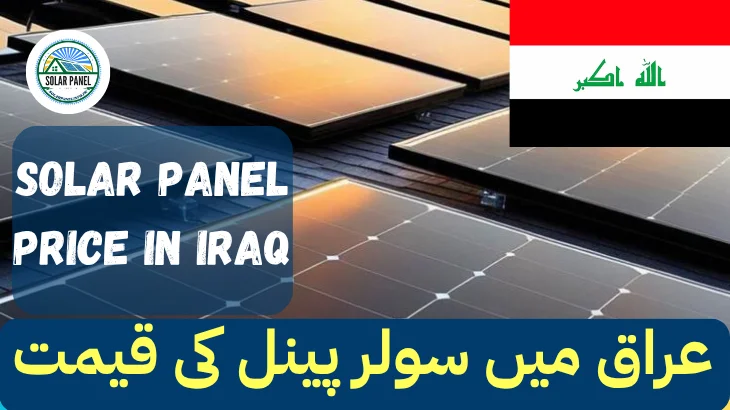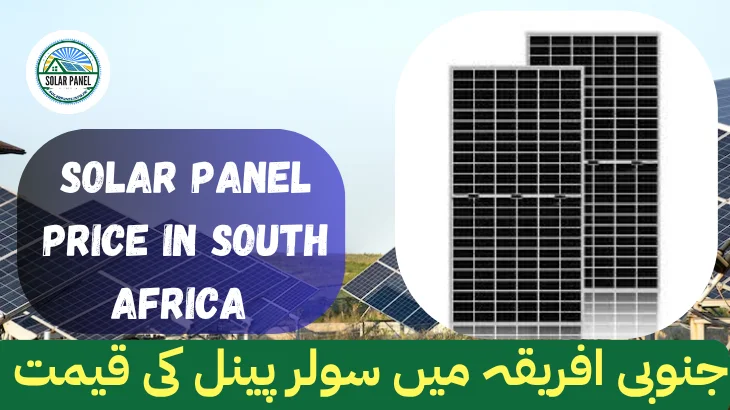Solar Panel Price In India
Solar panels convert sunlight into electricity, offering significant savings on electricity bills. In India, the cost of solar panels has decreased, making them more accessible, with prices typically ranging from Rs. 40,000 to Rs. 60,000 per kilowatt. Government subsidies help further reduce costs. As India shifts towards renewable energy, solar power is becoming a popular choice for households and businesses. The article also discusses solar panel prices in India for 2026, factors influencing costs, and tips for selecting the right solar solution. Here we will discuss the Solar Panel Price in India.
Read more: Cost of solar panels in Pakistan

सौर पैनल सूर्य की रोशनी को बिजली में बदल देते हैं, जिससे बिजली के बिल में काफी बचत होती है। भारत में, सौर पैनलों की लागत कम हो गई है, जिससे वे अधिक सुलभ हो गए हैं, जिनकी कीमत आम तौर पर 40,000 रुपये से लेकर 60,000 रुपये प्रति किलोवाट तक होती है। सरकारी सब्सिडी लागत को और कम करने में मदद करती है। जैसे-जैसे भारत अक्षय ऊर्जा की ओर बढ़ रहा है, सौर ऊर्जा घरों और व्यवसायों के लिए एक लोकप्रिय विकल्प बन रही है। लेख में 2026 के लिए भारत में सौर पैनल की कीमतों, लागत को प्रभावित करने वाले कारकों और सही सौर समाधान चुनने के सुझावों पर भी चर्चा की गई है।
Price of Solar Panel
| Brand Name | Price Range Per Watt | Watt Ranges |
|---|---|---|
| Warree Energies | ₹28 – ₹40 | 115W – 165W |
| Tata Power Solar | ₹30 – ₹45 | 288W – 330W |
| Adani Solar | ₹27 – ₹38 | 535W – 660W |
| Vikram Solar | ₹29 – ₹42 | 325W – 585W |
| Renewsys India | ₹28 – ₹40 | 615W – 650W |
| Goldi Solar | ₹25 – ₹35 | 680W – 705W |
| Saatvik Green Energy | ₹28 – ₹38 | 525W – 545W |
| Rayzon Solar | ₹27 – ₹37 | 530W – 540W |
| Loom Solar | ₹30 – ₹45 | Up to 500W |
| Solar Ace Energy | ₹26 – ₹36 | 375W – 530W |
Different Solar Panels in India
Tata Power Solar Panel टाटा पावर सोलर पैनल
Tata Power Solar is one of India’s leading solar panel manufacturers, offering efficient and reliable solar modules ranging from around 288W to 330W for residential and commercial use. They Provide Both on-grid and off-grid solar solutions, backed by strong domestic manufacturing facilities and competitive pricing.
| Model | Power Output | Cell Type | Panel Type | Effeciency | Warranty |
|---|---|---|---|---|---|
| TP288 | 288Wp | Polycrystalline | Standard | 14.8% | 10 years |
| TP291 | 291Wp | Polycrystalline | Standard | 15.0% | 10 years |
| TP294 | 294Wp | Polycrystalline | Standard | 15.1% | 10 years |
| TP300 Series | 300_330Wp | Polycrystalline | Standard | 15.4%_17.2% | 10 years |
| TP330 Black series | 330Wp | Monocrystalline | Aesthetic Black Frame | 17.0% | 10 years |
| TP540HG10B | 530_540Wp | Monocrystalline | Glass_Glass | 20.52%_21.29% | 12years
(product).30 years (performance) |
| TP600LG10B | 570_600Wp | Monocrystalline | Bifacial Glass-Glass | 20.47%_21.54% | 12 years (product),30 years (performance) |
Adani Solar Panel अदानी सोलर पैनल
Adani Solar is India’s largest integrated solar manufacturer, producing solar cells, modules, ingots, and wafers with a capacity of 4GW (scaling to 10GW). It offers high-efficiency mono and bifacial panels (535W-660W) using advanced technologies like TOPC and MonoPERC. Adani Solar is known for quality, has won multiple global awards, and is leading major renewable projects like the Khavda park, aiming to generate 45 GW by 2030.
| Model | Power Output | Cell Type | Panel Type | Effeciency |
| ASP_7_AAA | 355Wp | Polycrystalline | Standard | 17% |
| ASM-M10_144_AAA | 540Wp | Monocrystalline | PERC Half_Cut | 20.4% |
| Bifacial Series | 300_650Wp | Monocrystalline | Bifacial | Up to 21% |
Goldi Solar Panel गोल्डी सोलर पैनल
Goldi Solar is a leading Indian solar panel manufacturer based in Gujarat, founded in 2011. The company is known for its high-quality solar modules and is rapidly expanding its manufacturing capacity to become one of the largest solar manufacturers in India. Goldi Solar uses advanced AI-powered technology in production, exports to over 20 countries, and provides support to India’s renewable energy goals with a strong focus on innovation. Sustainability and quality.
| Model Series | Cell Count | Power Output | Technology | Effecieny |
| HELOC PlusG12 | 132 | 680_705 | N_Type TOPCon,Bifacial | Up to 22.70% |
| HELOC Pro | 156 | 580_600 | Mono PERC White Backsheet | Up to 21.50% |
| HELOC Pro | 144 | 525_560 | Mono PERC, Various
Backsheets |
Up to 21.70% |
| HELOC Pro | 120 | 435_455 | Mono PERC Various
Backsheets |
Up to 21.26% |
| GOLDI 66GN Poly | 66 | 300_310 | Polycrystalline | Up to 17.40% |
Types of Solar Panels Available in India
Before diving into pricing, let’s take a moment to explore the three key types of solar panels that are making waves in India. Understanding these options will help you make informed choices that best suit your energy needs!
Monocrystalline Solar Panels मोनोक्रिस्टलाइन सौर पैनल
Solar panels that are made from a single crystal structure offer impressive efficiency rates ranging from 18% to 22%. They are particularly well-suited for installations where roof space is limited. However, it’s important to note that these panels tend to be on the pricier side compared to other options.
Read more: Monocrystalline Solar Panel Price
Polycrystalline Solar Panels पॉलीक्रिस्टलाइन सौर पैनल
This type of solar panel is composed of multiple silicon crystals, contributing to its unique characteristics. The efficiency of these panels typically ranges between 15% and 17%, making them a viable option for many users. Additionally, they tend to be more budget-friendly compared to monocrystalline panels. However, one consideration is that they require more physical space for installation.
Thin-Film Solar Panels पतली फिल्म वाले सौर पैनल
When considering solar panels, lightweight and flexible options are available. However, it’s important to note that they typically have lower efficiency rates, ranging from 10% to 13%. While these panels may be more cost-effective, they are not commonly used for residential applications due to their reduced power output.
Best Solar Panels In India
The leading solar panel brands in India include Jinko Solar, Astrology, Warree, Vikram, and Panasonic. Jinko and Astrology produce highly efficient panels. Warree and Vikram are reliable and budget-friendly Indian brands. Panasonic is recognized as a premium option. When choosing solar panels, consider their performance, durability, warranty, cost, and local service availability.
Average Solar Panel system price in India
| System Size | Estimated Cost |
| 1kW | ₹65,000_₹85,000 |
| 2 kW | ₹1,05,000-₹1,25,000 |
| 3 kW | ₹1,50,000_₹1,70,000 |
| 4 kW | ₹1,85,000_₹2,05,000 |
| 5 kW | ₹2,30,000_₹2,50,000 |
| 10 kW | ₹4,50,000_₹4,60,000 |
Conclusion
As India speeds up its shift towards renewable energy, solar power emerges as a viable and sustainable option for both residences and enterprises. With falling prices, improved efficiency, and robust government backing, adopting solar panels is now more attainable than ever. Leading companies such as Tata Power Solar, Adani Solar, and Goldi Solar provide a variety of choices suited to diverse requirements and budgets. Whether your goal is to decrease electricity costs or aid in creating a more environmentally friendly planet, investing in solar energy in 2025 is a wise and future-proof decision.
जैसे-जैसे भारत अक्षय ऊर्जा की ओर अपना रुख बढ़ा रहा है, सौर ऊर्जा घरों और उद्यमों दोनों के लिए एक व्यवहार्य और टिकाऊ विकल्प के रूप में उभर रही है। गिरती कीमतों, बेहतर दक्षता और मजबूत सरकारी समर्थन के साथ, सौर पैनलों को अपनाना अब पहले से कहीं अधिक संभव है। टाटा पावर सोलर, अदानी सोलर और गोल्डी सोलर जैसी अग्रणी कंपनियाँ विभिन्न आवश्यकताओं और बजटों के अनुकूल कई विकल्प प्रदान करती हैं। चाहे आपका लक्ष्य बिजली की लागत कम करना हो या पर्यावरण के अनुकूल ग्रह बनाने में सहायता करना हो, 2025 में सौर ऊर्जा में निवेश करना एक बुद्धिमानी भरा और भविष्य-सुरक्षित निर्णय है।
FAQ’s
What is the average cost of a 1 kW solar system in India?
The average price of a 1kW solar system in India is between ₹65,000 and ₹85,000, based on the brand and type of system.
Are government subsidies available for solar panel installation?
Residential users can receive up to 40% subsidy through government schemes such as PM Surya Ghar and MNRE.
Which type of solar panel is best for homes?
Monocrystalline panels are ideal for homes with limited roof space because of their high efficiency, whereas polycrystalline panels are more affordable.


